- Home
- Jack Gantos
The Trouble in Me Page 2
The Trouble in Me Read online
Page 2
Mom had put me in charge of setting up the grill for the cookout because I was a pro at it, and as I now frolicked this way and that across our wide backyard in my crotch-shocking too-tight pants I put my whole body in motion. I felt good. Fire was in my future. I picked up speed, then more speed until I was skipping like a flat stone across the slick surface of the polished grass while my thoughts trailed behind me like a string of alphabet flags whipping sharply in the wind. Maybe those flags spelled out STORM WARNING and signaled me to slow down and consider the danger ahead, but I was in no mood to think about the perilous course I was setting.
In fact, thinking ahead never helped me much. Thinking on my feet worked best. Things happened and I reacted. That perfectly describes my version of thinking, which was not thinking insomuch as it was just stimulus-response instincts. I should have a knee-jerk trophy for that. It would look like a tiny squirrel brain mounted on the tip of a vibrating stick.
I was going full speed ahead across the yard and directly in my path was a hip-high concrete planter of stoic-faced Chief Osceola. I could have altered my course and navigated around the great-leader-turned-planter, but instead I leaped over him like a lighthearted singing sailor. The chief was holding a pot of wilted hibiscus and when the slick rubber sole of my back shoe slipped on the dry grass, my front shoe came down short and I cracked my ankle against Osceola’s rock-hard shoulder.
I tumbled over just once, then sprang neatly back up onto my feet as if my fall were a stunt I was practicing for the coming Olympics. I was fine. As I adjusted the dog bowl on my head I looked toward our back porch to see if my mother or sister might have caught that act. No one had. Perfection always struck me when no one was paying attention.
Still, my mom would figure out that something had happened because now I was covered with brittle needles of dried-up grass that had pierced my swabbie outfit, and as I plucked out each sharp blade a thin red dot of blood pooled up on the white cotton uniform. I sort of looked like a game bird that had been winged here and there with a load of miniature birdshot. But I was alive.
My ankle throbbed and I lifted my foot and rubbed the sore spot while I stood on my other foot like a dizzy flamingo. I was twitching about and hopping side to side from shifting my weight around to maintain my balance. Sweat pooled between my shoulders and a salty stream slipped like a zipper down my back. At that moment I seemed to step out of my own skin as if stepping out of a costume.
Overhead the glowing face of the Florida sun hovered like a stopped clock. I squinted upward and as I did so the thick, honeyed rays of light began to drape down around me like a slowly descending bell jar until I felt like a captive specimen under that airless amber glass. I looked down at my shadow as if I were my own sundial. I guessed it was sometime after two o’clock but not quite three—the hottest time of the day. The “blast-furnace” time of the day, the weatherman called it, because the scorching heat thinned the rising air. Old people stayed indoors breathing in and out of their oxygen tubes and then switching off to drink cold Key lime daiquiris through plastic straws. On especially hot days jets were grounded at Fort Lauderdale Airport because the air wasn’t dense enough for liftoff. After blast-furnace days like this there were always extra columns of obituaries listed in the newspaper of the old folks who didn’t survive the asphyxiating atmosphere.
Sometimes my mother and I read the obits out loud to each other. So many of the old people had been born in Europe.
One day, in the middle of reading about a woman from Warsaw, she closed her eyes and lowered the paper. “It’s just awful,” she said grimly. “This state is a graveyard for concentration camp survivors. God knows, after what they’ve been through they deserve better than this … this…”
She pawed her hand over the tabletop as if paging through a dictionary for the right word. “This … crematorium,” she said, settling regretfully on the word she both wanted and didn’t want.
I didn’t know what to say. The cruelty was unbearable to imagine. How fair was a life where you escaped Hitler’s fires but died of heatstroke?
My mother looked directly into my eyes. Her sadness entered me in a glance and pinned me down.
My eyes watered over and I lowered my chin and silently cried. I was no match for the depth of her grief and crumbled beneath it.
But now I had to get a move on. I needed that grill fire to heal me within. My heart was aching for it. I put one hand on Chief Osceola to steady myself as I lowered my sore foot onto the grass. I bent over at the waist with my hands on my wobbly knees. I could breathe easier that way. Maybe I had hurt myself more than I realized. Maybe I had hit my head when I took a tumble, or maybe the heat was getting to me.
I could probably use a glass of water. The ocean breeze had brought the humidity that was so thick the flies slowly circled around my face like winded swimmers. I reached up and plucked them out of the air as if they were blackberries on a bush. I slowly closed my hands. I didn’t crush them. They buzzed until they didn’t. I lumbered down to the brackish edge of the canal we lived on. The water was so sluggish and thick with some invasive African algae it smelled like steaming muck. Or maybe the canal had died long ago and the foul, gelatinous muck was the stranded carcass of the living water that had once thrived there. Now only the most toxic fish survived in it. Actually, they didn’t swim as much as they tunneled their way forward like spoons in chocolate pudding.
I flicked the flies onto the surface. Instantly the red mouth of a black snakehead took them under. Snakeheads were evil fish from Korea that seemingly had chewed their way through the center of the earth and had taken over the Florida canals. Swarms of them would attack and eat small alligators. They could even live on land. At night they slithered out of the muddy sludge and flopped around like spastic zombie fish searching the neighborhood for prey. In the morning you had to be careful when walking by the damp shrubs because they hid under the low hibiscus leaves and could spring forward and attack your feet or the mushroom-soft nose of a sniffing dog. I asked Dad for a speargun so I could shoot them, but he said I’d just hurt myself. Maybe.
I stood by the canal and wiped the fly bits from my hands onto my pants. I was a believer that every living thing was an important link in the chain of life, but I hated those snakeheads. Humans were supposed to be on a higher rung than others, but at the moment I didn’t feel like a shining example of a half-boy, half-man. I was fourteen but closer to being thirteen than fifteen. Or that’s how my mother put it. She gave me the late-bloomer trophy, which in her mind probably looked like a big peanut that would never be mature enough to outgrow its own shell.
Whatever. I really had to get a move on. My father wouldn’t be gone that long. The new pharmacy was in a strip mall about a half mile away next to the army-navy surplus store I liked to visit. So many kids had stolen stuff from the store that if you weren’t with a parent you had to get permission from the reluctant owner before you could come in and shop. He’d pat you down with his hard hands on the way out. Who could blame him? The kids in this sketchy neighborhood were known as thieves.
Anyway, I’d go there to shop for rare stuff like bravery-under-fire medals that I hadn’t earned. But mostly I liked to slowly patrol the aisles and smell all the useless stuff like rubberized gas masks, moth-eaten flight jackets, and boxes of broken chocolate bars covered in powdery white sugar bloom. All the military hardware had been lightly sprayed with machine oil to keep it from rotting. When I breathed through my mouth I could faintly taste the merchandise-flavored oil on the shelf in front of me. The distinctive flavor gave each object a realistic purpose and I could easily pretend I was in the war.
One time when shopping in the enemy-army surplus section, I had closed my eyes and when I breathed deeply I inhaled the horsey odor of Wehrmacht leather and imagined that was my final smell while kneeling before the polished boots of a German officer. He aimed a Luger at my head. He clicked off the safety and pulled the trigger. I tried to make myself pass out in the
store from the imaginary pain. Instead, I lost my balance and tilted face-first into the metal edge of a display shelf. I cut a notch out of my forehead that produced a trickle of blood. It was like the bullet had bounced off my thick skull.
I loved playing in that warehouse museum of war supplies, and was just thinking about it when a squealing car turned onto my street. I thought it was my dad, but it wasn’t. Broken water pumps were common in Ramblers.
My banged-up ankle felt a little better. I limped over to the grill and dragged it, and a bag of charcoal, from our side of the galvanized chain-link fence that separated us from the Pagoda family next door.
I set everything along the narrow streak of shade between two coconut palms. I filled the metal bowl of the grill until I had a rough pyramid of briquettes. Then I went back to the planter and picked up the can of lighter fluid. It had slipped out of my grip when I fell because the palms of my hands were sweating. I picked it up again. It slipped out a second time. So I used two hands this time. That’s called thinking.
I doubled back to the grill and squirted the entire can of lighter fluid onto the coals. That can had annoyed me, and with my two hands I squeezed out every wheezing last drop until I had flattened the sides together as if I had crushed its flimsy neck. The coals were so saturated with lighter fluid they began to look like huge, winking black jewels dripping with oily rainbows along their waxy edges. I wondered if they might spontaneously combust because of the heat. That was sort of a brain-dead question, but stepping out from the shadow of that dumb question was the untested notion that if I did something theatrical I might just jolt myself from the stupor of my lousy mood and get back into the birthday-party spirit.
So I took the theatrical test I had in mind. I leaned back from the grill, and with one hand tossed the empty can end over end into the canal. With my other hand I tugged a pack of wooden matches from the back pocket of my uniform. In one motion I struck a match and flicked it lazily toward the grill. The match arced through the air like a tiny toy torch thrown by a tiny toy soldier at a tiny toy castle, and then before it reached the grill it vaporized as the whoosh of an Old Testament fireball hit me full on.
THE FOLLOWER
I had to have yelled out an unmanly scream as I quickly covered my face and dropped down to one knee. The red blossom of heat puckered the skin along my forearm, and as the flame sucked back into itself I lowered my arm to look at the damage. In an instant a colony of small milky blisters appeared from my wrist to my elbow. I smelled burning hair and fuel as if I were a soldier trapped in a shell-punctured tank.
My heart pounded. Wow, I thought, that perked me up!
I was grinning and laughing hysterically with my crazy Popeye “guh-guh” laugh, which I hadn’t felt inside me for a good, long while. The last two months I had fallen into a gloomy rut. But that was suddenly over. I was laughing again. I danced around and thrust out my legs, jabbing them left and right as if I had just karate-kicked open the golden door to eternal happiness. I was snorting out my nose.
“Oh my God!” I shouted up into the sky. “I love fire!”
I slapped at myself. Smoke drifted off my clothing and hair and I felt alive. Nothing, it seemed to me, had ever wanted me more than those flames whose healing hot hands seized me by the shoulders and ordered me to “Wake up!” and I wanted nothing more than to be fully awake, and unexpectedly it occurred to me that I had never closed my eyes and slowly kissed a girl on the lips.
Why did I think that?
If inhaling a storm cloud of flame was what a kiss would feel like, then I was ready to try finding a girl to kiss, but girls always looked at me and turned away as if I were the immature boyfriend they had outgrown and discarded. The closest I got to feeling their hands on me was when they held a pencil and scratched my name off a list of possibilities.
So I turned to where I was always wanted and stared wide-eyed into the unwavering column of beautiful dancing flames that thrust upward from the grill as if a rocket had crashed in front of me like a dart into the dirt and the engine was still roaring full blast. The thrusting flames stood out like bloodred bayonets of molten steel. The power of those flames was purifying. Staring into them set the canyons of my mind on fire and charred the weedy debris of dead thoughts. Flames were a natural language more powerful than the chaos of wind or water. Flames wanted to renew a world that had become tiresome and I wanted my tiresome world to be renewed. Even the wounded chambers of my heart, cleansed of all my father’s awful insults, relaxed into a much-needed sleep. At that moment my dreams felt stronger than my weaknesses.
After a minute those glowing pickets of flame began to lower, and above them I could see a devil’s ruddy, heat-wavering face and it was leaning forward and staring directly into mine. He had red-hot hair that glistened with oily sweat. It was cut short except in the front where it curled onto his forehead like a burnished copper wave breaking down over his eyes and nose and mouth. As the flames further declined I saw his red neck and shirtless chest and his open black leather motorcycle jacket with glinting silver snaps and diagonal zippers all as liquid bright as mercury, and below the dangling leather belt buckle was the elastic waistband of a pair of boys’ undershorts with SEARS stretched across the top, and below the undershorts were two skinny red-haired rooster legs with just one white pointy leather shoe cocked over the top edge of a short garden pitchfork.
He pushed his hair back to where I could see his face and he was having a good laugh at my expense. He wasn’t tall but he was muscular enough, and when he lifted and stabbed the pitchfork into the earth he grunted and then levered up a damp clod of sandy clay, swiveled around, and tossed it aimlessly over his shoulder. The chunk of dirt did a cannonball right into their swimming pool. He didn’t care to notice. He kept staring at me as if I were his trophy and he was digging a tunnel to hell and at any moment he was going to take me with him.
Then, as the flames crouched down onto the coals like little dancing ghosts, his face remained and I realized he was a real person and not some overheated hallucination. It had to be Gary Pagoda, the mysterious next-door neighbor my mother had warned me about. She had seen him escorted to his front door by a man in a blue suit. They had driven up in a patrol car with a door logo that read BROWARD COUNTY JUVENILE PROBATION.
I hadn’t met Gary yet, but the other day when I was mixing a batch of homemade navy napalm by slowly stirring gasoline into a jar of Vaseline I had heard what I figured was his mother’s husky voice holler out the window, “Gary, you get back here and finish filling out these forms!”
I remembered the moment clearly because it happened just as I was sucking the napalm up into a turkey baster and squirting a thick stream into the conical opening of a crusty termitary tower.
“If you don’t straighten up,” she continued, “and take your paperwork to your juvie group session, your probation officer is gonna jerk your butt back in jail!”
Gary was standing on his front lawn and his eyes were fixed on a white Ford pickup that had pulled a crisp U-turn in front of his house. A blond girl was driving. She waved to him and smiled. No girl had ever smiled at me with such sunny and almighty intentions. It left an impression on me.
“Did you hear me!” his mother continued as I lit the termite cone on fire.
Of course he heard his mother. We all had. But Gary’s black leather profile was like an eclipse that slowly changed day into night as he passed between his house and the clean white truck. He never answered his mother and without hesitation he raised his middle finger straight up and corked it tight into the eye of the sun. He stood there grinning in triumph and then he lowered his arm until the shadow of that finger stretched across the lawn like the needle of a compass and pointed directly into the cab of the truck. At that moment the girl kicked open the passenger door and reached out with both of her slender tan arms toward his glowing face. That was a golden-armed trophy moment for him.
But not for me. Or for the termites who died for no other reaso
n than I liked to hear their chitinous exoskeletons go pop!
Now I continued to stand in front of my blistering grill as Gary stopped shoveling and pointed a finger at me and laughed his ass off. I could smell something burning. In a panic I looked down at my uniform and whirled around and wildly slapped at myself while fearing I was on fire. I turned back toward him.
“What?” I hollered with the palms of my hands spread open in alarm. “What?”
He just kept pointing.
“Just tell me!” I called out with more desperation. “What?”
He raised his finger and pointed above my head.
“Oh, crap!” I shouted as I snapped my head up and saw what I knew I would. Before Dad and I left the house that morning I had arranged for my older sister to tie a banner I had made of fancy gold-edged naval alphabet flags copied from the nineteenth-century USS Pennsylvania that spelled out HAPPY BIRTHDAY COMMODORE between the palm trees. Now the banner was furiously on fire from the oil paint I had used on the flags and it was nosing downward on one end like the flaming Hindenburg.
“Noooo!” I cried out, painfully realizing that my trophy moment was going up in smoke on its way down to the ground, and there was no chance I was going to re-create it and impress my father, who puffed out his chest when we all saluted him and addressed him as “Commodore.” The ladder was still against a tree trunk, and quick as a monkey I scrambled up the rungs and reached out and yanked down the laundry rope of burning flags. I jumped from the ladder and hit the ground and did a somersault and yelped again because of the dang sharp grass needles, but I didn’t have time to cry about it because I had to fold up the smoldering banner of painted cardboard before one little spark set the whole dry grass yard into a blazing inferno. So I moved quick as a cat and with my stinging hands rolled the banner up into a large wad of cardboard and rope and in one swift moment picked it up and ran toward the canal, where I threw it overhead as far as possible. It didn’t go far. The smoldering ball slowly fluttered down into a loose heap of fallen puppetry on the starter fluid can. There must have been enough fluid left to leak out and form an oily slick on the muck, and the next thing I knew a circle of flames flared up around the can and the banner. I stood there wondering what I might do next to put out the fire and get rid of the evidence.

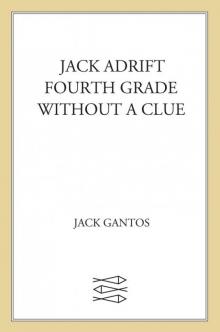 Jack Adrift
Jack Adrift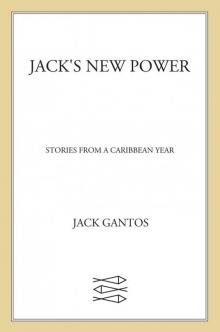 Jack's New Power
Jack's New Power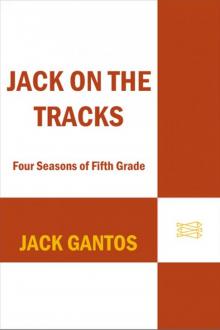 Jack on the Tracks
Jack on the Tracks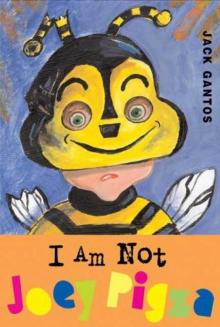 I Am Not Joey Pigza
I Am Not Joey Pigza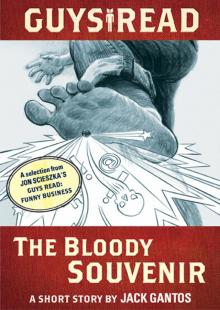 The Bloody Souvenir
The Bloody Souvenir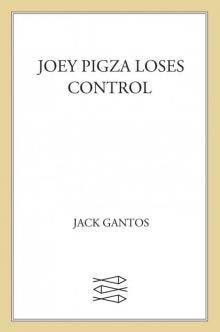 Joey Pigza Loses Control
Joey Pigza Loses Control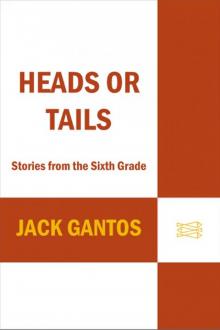 Heads or Tails
Heads or Tails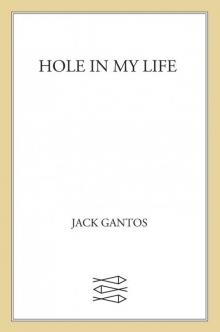 Hole in My Life
Hole in My Life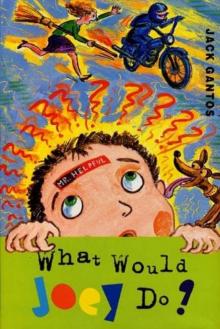 What Would Joey Do?
What Would Joey Do?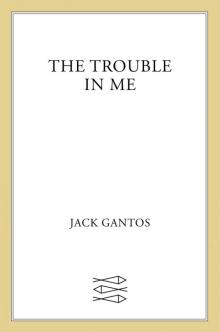 The Trouble in Me
The Trouble in Me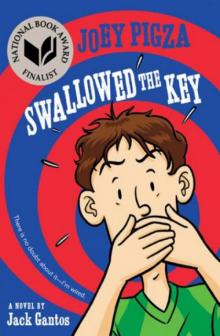 Joey Pigza Swallowed the Key
Joey Pigza Swallowed the Key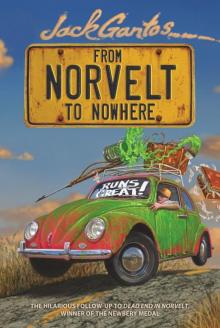 From Norvelt to Nowhere (Norvelt Series)
From Norvelt to Nowhere (Norvelt Series)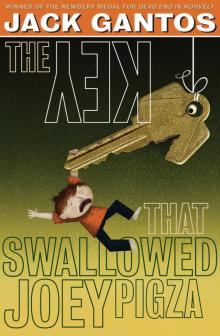 The Key That Swallowed Joey Pigza
The Key That Swallowed Joey Pigza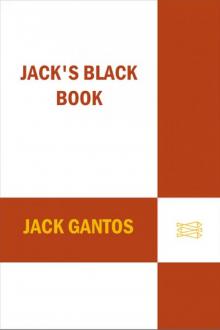 Jack's Black Book
Jack's Black Book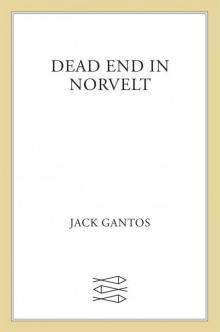 Dead End in Norvelt
Dead End in Norvelt